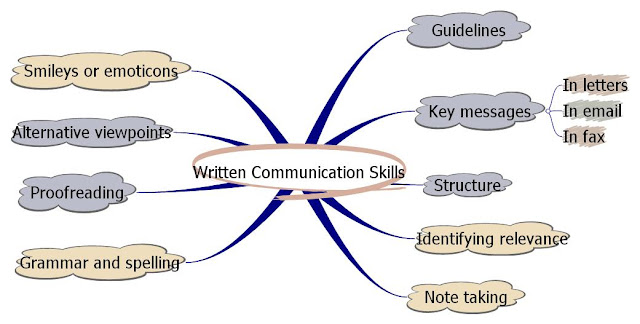
11/17/ · 4 Skills of Persuasive Communication. There are four primary persuasive communication skills: Listening. Listen to understand, rather than just wait for your turn to talk. blogger.com: Martin Yate Written communication skills 42 Long complex sentences Existing is being unique. Existence, reality, essence, cause, or truth is uniqueness. The geometric point in the centre of the sphere is nature’s symbol of the immeasurable uniqueness within its measurable effect. A centre is always unique; otherwise it would not be a blogger.com Size: 1MB 3/1/ · Written communication. Written communication is a vital skill for writers, marketers, office staff, and all remote workers. While your whole resume serves as a testament to your writing ability, you can give more weight to your writing skills by mentioning how they’ve helped you succeed blogger.comted Reading Time: 6 mins
20+ Effective Communication Skills (Good for a Resume)
Written communication skills are those necessary to get your point across in writing. While they share many of the same features as verbal communication skills, there are some important differences. Where verbal communication uses body language and tone of voice to express meaning and tone, written communication relies on grammar, punctuation and word choice. Developing written communication skills requires practice and fine attention to detail.
Read more: How to Improve Communication Skills. In professional settings, great written communication skills are made up of five key elements. Look at some examples of each of these elements below:. Clarity helps your reader understand what you are saying or, at least, understand enough to written communication skills what questions they need to ask for further clarification. Clarity comes from writing in simple language and sticking to concrete, specific information:. Example: "We are implementing a new late policy to ensure that all employees can confidently rely on our agreed-upon schedule.
See the details of the new policy below. If you have any questions, written communication skills, you may direct them to the head of human resources. The above example gets to the goal of the message right away, written communication skills, touches on the intention behind the policy change, and provides explicit steps to follow in case a reader needs further clarification.
Include only the details that are necessary to communicate your point:. Concise writing, like that in the above example, helps maintain clarity by avoiding unnecessary details or overly complicated sentence structures. It also lends more confidence to your writing. In business writing, your tone should be one of professionalism blended with varying degrees of formality and friendliness:. I highlighted a written communication skills inaccuracies found in this report and attached the latest numbers from our accounting department.
Please get the revised report back to me by Friday afternoon. If you have any questions, feel free to ask. Even while communicating negative news, such as pointing out mistakes, avoid accusations or language that might make the reader feel singled out, written communication skills. You also want to be specific. Active voice is typically more accessible and easier to follow for readers than passive voice. Written communication skills voice helps a sentence flow better and allows the reader to move through your writing at a quicker pace.
Complex, passive voice has its place in other forms of writing, but it slows the reader down in professional communication. How much you pay attention to precise grammar and punctuation will depend on how formal the writing needs to be. However, even in informal writing, grammar and punctuation are important for ensuring that your point is getting across. Without correct use of commas, articles, prepositions, verb tense and other basic grammar, the sentence above would be difficult to understand.
Related: Nonverbal Communication Skills. Having a clear goal in mind keeps your writing focused and clear. This goal might be to get the reader to take action, respond to your email, or to know of important information. Whatever your goal may be, you want to get to it as quickly as possible at the beginning of the message. Lead with the key point and follow up with the details needed to understand it. Organizing your message in this way gets the point across in a way that even readers who might skim through it will understand.
State what specific details you expect that report or update to include. The reader should be able to immediately understand what you expect from them and when without decoding your message, written communication skills. If you can remove a whole sentence and the reader could still figure out what they need to do, consider removing it, written communication skills. For longer texts such as a report, take the time to write out an outline to organize your thoughts and determine the best way to organize the information.
Outlines can be invaluable resources as you write because they ensure that you make every necessary point in a logical order. The safest approach is to assume all written communications could be shared with the entire office.
Read through everything two or three times. Besides proofreading for basic grammar and spelling, pay attention to how it sounds. Then, save a draft and step away from it for a few minutes while you work on another task, written communication skills. Come back to it afterward and read through it again.
A great way to build editing into your work routine is to write drafts of all the emails you written communication skills to send out. Then, once all the drafts are complete, go back to the beginning and edit each of those drafts before finally sending them. Read more: Common Communication Barriers With Examples. Written communication skills are essential at every stage, from getting the job to performing it to the best of your ability. Your resume should be easy to skim and highly focused on highlighting your greatest accomplishments and your strengths.
Rely on bullet points, lists and clear headlines. You want to use this as an opportunity to show your ability to communicate concisely and clearly. Unlike your resume, your cover letter should be composed of more rich detail and well-constructed sentences. This is where you show your ability to weave details into a clear and engaging narrative.
Tell your story with a clear purpose. Rather than a bullet point list of achievements, written communication skills, focus on one or two of your great ones and weave written communication skills accomplishments into a story that shows how your unique strengths and experience helped you achieve those outcomes. While your job interview will be more about your verbal communication skills, you still want to make sure your responses are clear, concise and concrete.
This will reinforce the impression that you know how to communicate with purpose and efficiency. After the interview, you have written communication skills final opportunity to showcase your written communication skills. The thank you letter or email allows you to show your ability to balance professionalism and friendliness.
Your thank you letter can show off your mastery of tone and your attention to detail. Most jobs today will require sending emails on a near-daily basis. A well-written email is direct, specific, and provides clear next steps for the readers whether that next step is responding to your email, scheduling an appointment, completing a task or letting them know they can ask you questions they might have.
Doing that well means providing organized, easy-to-read reports that even people who might not be familiar with your department can understand. If you need to use specific terminology, make sure you take the time to include definitions and explanations, written communication skills.
Skip to main content Indeed Home, written communication skills. Find jobs Company reviews Find salaries. Upload your resume. Sign in. Find jobs. Company reviews. Find salaries. Create your resume, written communication skills.
Change country ���� United States. Help Center. Career Development. What are written communication skills? Written communication skills examples. Active voice. Grammar and punctuation. How to improve your written communication skills communication skills. Know your goal before you begin writing. Include only need-to-know written communication skills. Is the goal of the message clear and concrete? Is this detail necessary for the reader to understand the goal of the message?
Is this written as simply and directly as possible? Make use of outlines, written communication skills. Keep it professional. Edit thoroughly. How does it flow? Does it make sense? Are there too many unnecessary details? Are there any missing written communication skills needed to understand the main point? Have you written it simply and directly? How written communication skills showcase your written communication skills.
On your resume. In your cover letter. In your job interview. In your thank you letter. In your emails.
Effective Writing Skills -- Become a Master Writer -- Part 1 --
, time: 11:31Importance of Written Communication Skills and Tips to Improve Them - Penlighten

9/29/ · Communication skills at the workplace can be broken down into three distinct categories: verbal, non-verbal, and written. Verbal communication is communication that is spoken. However, it gets trickier, as effective verbal communication involves nuances such as /5() 3/1/ · Written communication. Written communication is a vital skill for writers, marketers, office staff, and all remote workers. While your whole resume serves as a testament to your writing ability, you can give more weight to your writing skills by mentioning how they’ve helped you succeed blogger.comted Reading Time: 6 mins 11/17/ · 4 Skills of Persuasive Communication. There are four primary persuasive communication skills: Listening. Listen to understand, rather than just wait for your turn to talk. blogger.com: Martin Yate

No comments:
Post a Comment